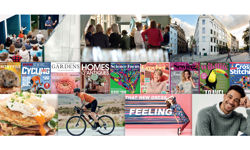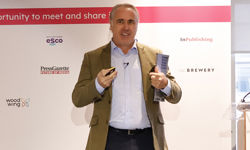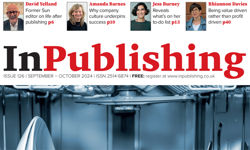Should magazines have a bit more steak and a bit less sizzle?
In November last year, James Ward organised his second conference in Bethnal Green. The name of the conference was Boring and among its highlights, if that's the word, were presentations on subjects as mundane as yellow lines, self-service check-outs and toast. It sold out.
The clever papers sent journalists who filed patronising pieces illustrated by pictures of people asleep. But maybe the Boring joke was on them, as it is on anyone who makes their living by pretending to know what it is that people find the opposite of boring. If they were honest with themselves, they might look at their own declining circulation figures and reach the conclusion that what they have traditionally considered exciting material no longer has the same sway over people that it once had.
A lot of the problems start with the word ‘exciting’. During his brief tenure as director general of the BBC at the end of last year, I met George Entwistle. He seemed a nice man though I wondered why he would say in his statement that he felt it was the Corporation's job to "take audiences on the most exciting content journeys of their lives".
Setting aside the use of the word ‘journey’, without which no contemporary conversation in broadcasting is complete, I wondered what programmes he could have been thinking of when he talked about "exciting content journeys". Michael Palin's Brazil? Doctor Who? Later With Jools Holland? The Chelsea Flower Show? The Moral Maze? Brian Matthew's Sounds Of The Sixties? Do even the people who work on them think they're ‘exciting’? I value the BBC as much as the next man, but I don't particularly expect its output to excite me. I expect it to inform me, certainly, to amuse me, even possibly to stimulate me, but I can't remember the last time I felt excited by anything on radio or TV other than a live sporting event.
One of the consequences of multi-channel everything is a steadily rising drum beat of over-statement and bogus hysteria. Magazines have got the virus worse than anyone. It's no longer enough to offer a list of some records you might like. It has to be "100 albums you have to hear before you die". It's always the ultimate diet, the unbelievable interview and the sensational picture spread. Hype is stitched into the very fabric of all media. Its presence is so constant that we filter it out without realising we're doing it.
For years, magazines have pioneered a form of breathless presentation that pretends that things are more exciting than they actually are. Screamers are scattered across covers as if the excitement from looking inside might be so intense as to hazard one's health. But is anyone actually listening and if they are, does anybody really believe that Men's Health will give them "six pack abs in fifteen minutes a day" or that Easy Living can "transform your life in a year"?
A minimalist approach
Which brings me to The Magazine, an iPad and iPhone-only publication recently launched not by an editor but by a developer called Marco Arment. While traditional magazine editors are struggling to adapt their quart of printed material into the oddly-shaped pint pot that is the tablet, it's interesting to see the approach of people who don't call themselves editors. Having introduced the very successful web service Instapaper, Arment is in a better position than most to do this.
The thing I find interesting about The Magazine is it doesn't try to be exciting. It doesn't see it as part of its job. It has instead been likened to a sub-compact car in the way that, instead of trying to scale down the features of a print magazine, The Magazine starts with the bare minimum of features and builds out only when it needs to. It comes out approximately fortnightly and it has just four longish reads inside it. It's very niche at the moment, as these things tend to be. Its mix is the kind of thing that would appeal to a novel-reading nerd: a piece trying to encourage Americans to drink tea, another describing the experience of watching the Tour De France at close quarters, something about the pitfalls of self-publishing, something else about one's elderly father telling you how he met your mother. It's not GQ. On the other hand, it's not Reader's Digest either. In fact, it's full of the kind of pieces that a commissioning editor would reject with the regretful words, "if it were up to me…"
The Magazine doesn't bother with page layouts. Everything just scrolls. You are not called upon to make it work as if it were a new gadget. There are barely any pictures. The occasional informative footnote pops up. The features are long enough to feel worthwhile to read but not as bleak and interminable as long magazine features can seem when hidden behind a screen.
The Magazine doesn't have the furniture and regulars - cover, contents, news section, bitty spread up front, pictorials to break the monotony throughout, product round-ups near the back, material that is only there to give the ads something to be sited opposite - which have accumulated barnacle-like around print magazines for reasons that make sense in the world of print.
It's very calming to read. It's not trying to excite you. Most publishing people will hate it, probably for the same reasons that I rather like it, most of which are bound up with its attempts to re-define what's interesting and what's boring.
It probably won't work, whatever that means. It was ever thus. Pioneers are usually dead men with arrows in their backs and there will be just as many corpses around in the early days of digital magazines as there have been in the paper kind. Nevertheless, the format of Marco Arment's magazine is interesting because it prompts magazine people to think about something they usually take for granted. What's good? Over and above the ability to dominate a competitive set, what actually constitutes a good magazine? Do the same things still denote quality and value that always did? And is it possible that, beneath the difficulties of the present time, the question about quality is the one we are failing to answer honestly?
Pacing, variety, colour, break-out boxes, punning headlines and saucy captions - the whole ornate lingua franca of traditional consumer magazines - are all things people have traditionally found appealing but we would do well to remember that they're not the only things they find appealing. They might also appreciate depth, reflectiveness, even seriousness, from time to time. Maybe we've had enough of garishness, brashness and over-claiming, of magazines with artificial flavouring and e-numbers, where the colour and contrast is permanently turned up so high, you can no longer make out the proper colours. Maybe we've read the last star interview where they've picked the pull-quote just because it has the word "sex" in it. Maybe we need to cut down on the sizzle and think instead about the steak. Or would that be boring?
All about the Brand?
Haymarket announce that in future they won't have editors for business magazines like Campaign, Marketing and PR Week. Henceforth, they will have ‘brand editors’. This is to emphasise that, in future, the paper product will not enjoy a privileged status and that these senior content people will be spending as much time on the associated website or event. I know what they mean but I'm not convinced that tacking additional words on to job titles that enjoy a certain time-honoured mystique is going to change the way the outside world looks at them. What a film director does has changed massively since the days of Alfred Hitchcock but the title hasn't. What record producers do varies greatly but everybody wants to be called the producer.
People have an idea of an editor, which they probably acquired years ago while watching Lou Grant. They don't know what it means but what they understand by it is a certain kudos. When they think of a publisher, they think of somebody chewing a cigar in front of a whirring printing press. The word ‘brand’, on the other hand, makes people think of washing powder. It diminishes whatever word it is placed next to. You can't imagine a brand musician, a brand artist or even a brand journalist. And there is little sign that publishers are happy to change the job title written on their own doors to ‘senior ad salesman’, which is actually nearer the mark when it comes to describing what many of them actually do.
I won't think it's a good idea to mess around with any of the industry’s traditional job titles until I meet a young person who, when asked what is their ambition, flushes slightly, looks down and then says "what I really want to be is a brand editor".












